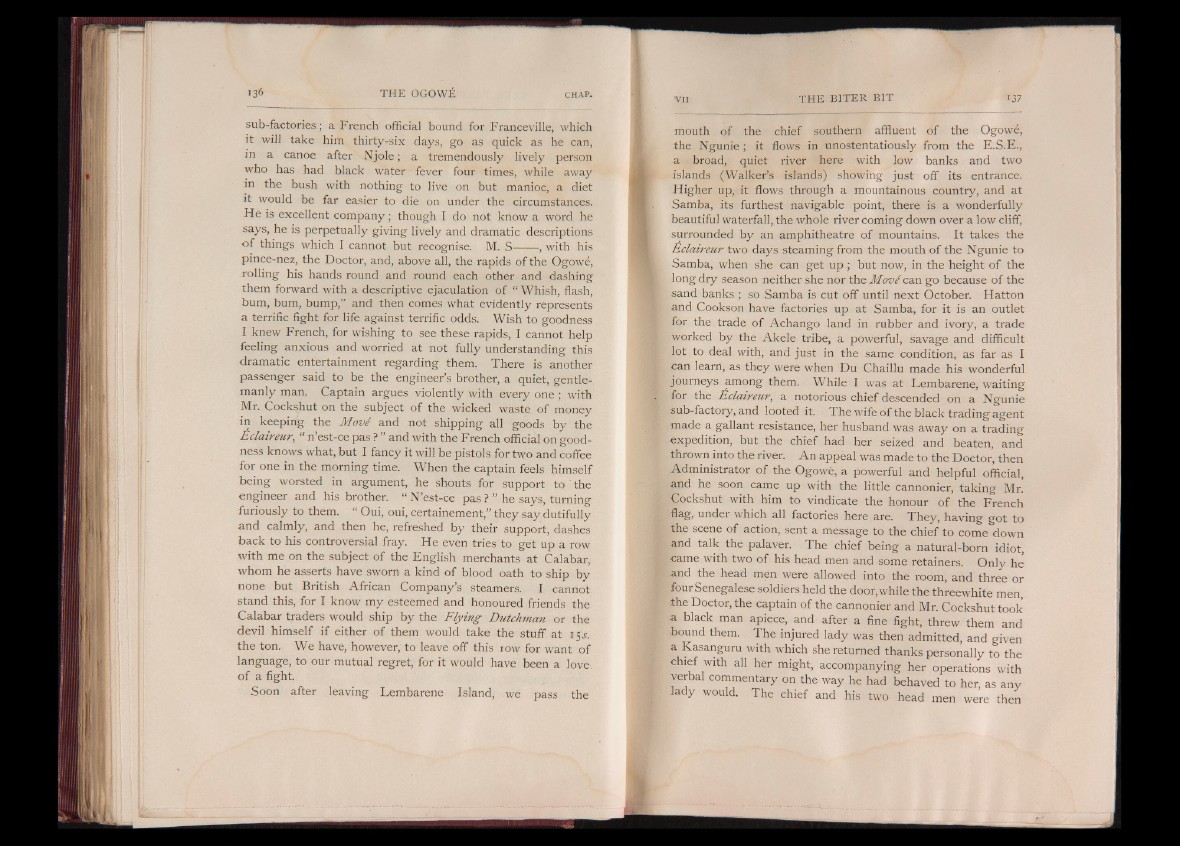
sub-factories; a French official bound for Franceville, which
it will take him thirty-six days, go as quick as he can,
in a canoe after Njole; a tremendously lively person
who has had black water fever four times, while away
in the bush with nothing to live on but manioc, a diet
it would be far easier to die on under the circumstances.
He is excellent company; though I do not know a word he
says, he is perpetually giving lively and dramatic descriptions
o f things which I cannot but recognise. M. S , with his
pince-nez, the Doctor, and, above all, the rapids of the Ogowe,
rolling his hands round and round each other and dashing
them forward with a descriptive ejaculation of “ Whish, flash,
bum, bum, bump,” and then comes what evidently represents
a terrific fight for life against terrific odds. Wish to goodness
I knew French, for wishing to see these rapids, I cannot help
feeling anxious and worried at not fully understanding this
dramatic entertainment regarding them. There is another
passenger said to be the engineer’s brother, a quiet, gentlemanly
man. Captain argues violently with every one ; with
Mr. Cockshut on the subject of the wicked waste of money
in keeping the Movt and not shipping all goods by the
Eclaireur, “ n’est-ce pas ? ” and with the French official on goodness
knows what, but I fancy it will be pistols for two and coffee
for one in the morning time. When the captain feels himself
being worsted in argument, he shouts for support to ' the
engineer and his brother. “ N’est-ce pas ? ” he says, turning
furiously to them. “ Oui, oui, certainement,” they say dutifully
and calmly, and then he, refreshed by their support, dashes
back to his controversial fray. He even tries to get up a row
with me on the subject of the English merchants at Calabar,
whom he asserts have sworn a kind of blood oath to ship by
none but British African Company’s steamers. I cannot
stand this, for I know my esteemed and honoured friends the
Calabar traders would ship by the Flying Dutchman or the
devil himself if either of them would take the stuff at 1
the ton. We have, however, to leave off this row for want of
language, to our mutual regret, for it would have been a love,
of a fight.
Soon after leaving Lembarene Island, we pass the
mouth of the chief southern affluent of the Ogowé,
the Ngunie ; it flows in unostentatiously from the E.S.E.,
a broad, quiet river here with low banks and two
islands (Walker’s islands) showing just off its entrance.
Higher up, it flows through a mountainous country, and at
Samba, its furthest navigable point, there is a wonderfully
beautiful waterfall, the whole river coming down over a low cliff,
surrounded by an amphitheatre of mountains. It takes the
Éclaireur two days steaming from the mouth of the Ngunie to
Samba, when she can get up ; but now, in the height of the
long dry season neither she nor the Mové can go because of the
sand banks ; so Samba is cut off until next October. Hatton
and Cookson have factories up at Samba, for it is an outlet
for the trade of Achango land in rubber and ivory, a trade
worked by the Akele tribe, a powerful, savage and difficult
lot to deal with, and just in the same condition, as far as I
can learri, as they were when Du Chaillu made his wonderful
journeys among them. While I was at Lembarene, waiting
for the Éclaireur, a notorious chief descended on a Ngunie
sub-factory, and looted it. The wife of the black trading agent
made a gallant resistance, her husband was away on a trading
expedition, but the chief had her seized and beaten, and
thrown into the river. An appeal was made to the Doctor, then
Administrator of the Ogowé, a powerful and helpful official,
and he soon came up with the little cannonier, taking Mr.
Cockshut with him to vindicate the honour of the French
under which all factories here are. They, having got to
I the scene of action, sent a message to the chief to come down
and talk the palaver. The chief being a natural-born idiot,
came with two of his head men and some retainers. Only hé
and the head men were allowed into the room, and three or
. four Senegalese soldiers held the door, while the threewhite men,
the Doctor, the captain of the cannonier and Mr. Cockshut took
a black man apiece, and after a fine fight, threw them and
bound them. The injured lady was then admitted, and given
a Kasanguru with which she returned thanks personally to the
chief with all her might, accompanying her operations with
verbal commentary on the way he had behaved to her, as any
lady would. The chief and his two head men were then